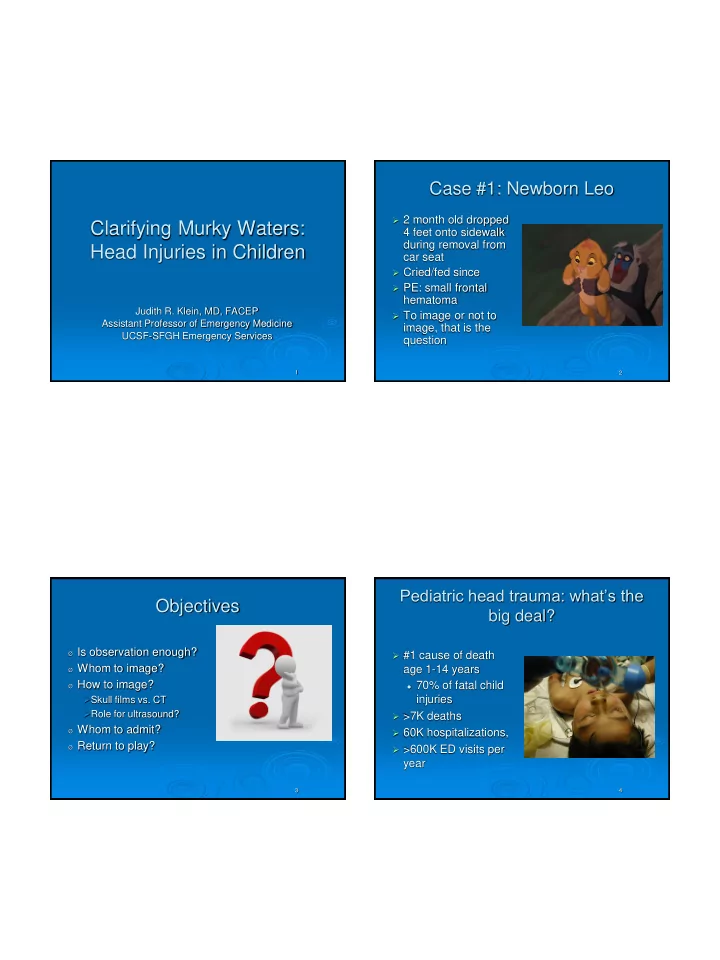

2/16/2014 Case #1: Newborn Leo 2 month old dropped Clarifying Murky Waters: 4 feet onto sidewalk during removal from Head Injuries in Children car seat Cried/fed since PE: small frontal hematoma Judith R. Klein, MD, FACEP To image or not to Assistant Professor of Emergency Medicine image, that is the UCSF-SFGH Emergency Services question 1 2 Pediatric head trauma: what’s the Objectives big deal? Ø Is observation enough? #1 cause of death Ø Whom to image? age 1-14 years Ø How to image? 70% of fatal child Skull films vs. CT injuries Role for ultrasound? >7K deaths Ø Whom to admit? 60K hospitalizations, Ø Return to play? >600K ED visits per year 3 4 1
2/16/2014 Who gets imaged? Why worry? 40-50% with CHI to ED get imaged!! Higher CT rates: 3 to 6% incidence of white race TBI post minor head trauma older Up to 20% of kids < 2 general vs pediatric hospital years old with TBI are emergent triage status asymptomatic! attending treated Second impact syndrome 5 6 6 Implications of imaging GCS>14: To CT or not To CT?? Reduce # of CT’s performed Cognitive development Cancer/brain dev Lifetime cancer risk Sedation from 1 head CT (3mSv): $$$$ IQ Identify all TBI or just 1:1500 (1 yr old) Identify TBI Cancer CI TBI? $$$ 1:5000 (10 yr old) Sedation NSU intervention < 10% of CT’s have Hospital >2 any TBI nights/intubation>24 hrs 0.5% of CT’s with Death/long term clinically important (CI) TBI neurological sequelae 7 7 8 2
2/16/2014 PECARN Minor Head Trauma The Science Decision Rule Several CDRs available Derivation and validation study Only 2 included infants 42K kids GCS>14: PECARN rule the best: >10K under 2 yrs Largest, 25 centers <2 years: Lots of young kids 100% NPV for CI TBI and all TBI Clear reference >2 years: standard for CI TBI 99.9% NPV for CI TBI Best validation 98.4% NPV for all TBI CT by 20-25% Kuppermann, Lancet 2009 9 9 10 Under 2 years old Over 2 years old Why identify all TBI: implications for sports/other activities? Why identify all TBI: implications for sports/other activities? Kuppermann et al. Lancet 2009 Kuppermann et al. Lancet 2009 3
2/16/2014 Severe Mechanism Back to Baby Leo MVA with ejection, rollover or death of Imaging? another occupant A good idea.. Pedestrian or bike w/o helmet Imaging for <3 vs. car months with scalp Fall >3 ft (<2 yr) hematoma + >3 ft fall or >5 ft (>2 yr) Thin skull easily fractured strong High impact object to correlation with TBI head 13 13 14 Ultrasound and skull fracture? Well, can I just do a skull x-ray? CT cons: Skull film cons: Skull fx 4-20x likelihood of TBI Radiation Hard to read 15-30% with skull fx TBI Cost Not sensitive/specific Prospective study*: enough Transport from ED If (+) still need to do 55 patients Sedation CT 100% sensitivity 95% specificity Include in CDR for low risk? Survey says: CT If US +, then CT? If US -, observe? *Parri, J Emerg Med 2012. 15 16 16 4
2/16/2014 Baby Leo gets a CT Admit criteria for skull fracture How do I keep him Very young-->higher still? bleeding risk Swaddle Depressed Dextrose H 2 0 Widely diastatic Acetaminophen High energy mechanism CT shows a skull fracture over High risk location posterior fossa (sutures, posterior fossa, dural sinus) Admit? Poor home situation YES 17 18 Case #2: Wild Bill Wild Bill: CT or Observation? 20 month old rolls Rule: CT or 6 hour obs for down 12 stairs all < 2 years with non-frontal “Few seconds of scalp hematoma Location, location…: LOC” Cried. Ate. • Temporal > parieto- Physical Exam: occipital > frontal GCS? Severe mechanism?: • Stairs vs. straight fall Talk his language LOC too brief to count 3 cm temporal but... hematoma Verdict: Very careful To CT or not to CT? observation or CT 19 20 5
2/16/2014 Case #3: The Car’s a Mess... Keeping Bill Still 5 year old helmeted bike vs low speed MV Sedation choices: No LOC Ketamine is OK V x 3 en route Rectal methohexital Mild headache Dexmedetomidine PE: IV/IM pentobarbital Playing Etomidate Small parietal scalp Avoid versed hematoma Brutane CT (+) epidural: To CT or not to CT? Admit 21 22 Discharge home? Let’s talk observation Criteria: > 2 years Normal MS Isolated vomiting Vomiting controlled No LOC No abuse suspected Responsible home/ Non-severe reliable transportation mechanism Normal head CT* Mild headache Confused after normal Consider observation CT? if parents comfortable Observe x 4-6 hrs -->admit if still AMS Holmes, Annals EM, 2011. 23 24 6
2/16/2014 Case #4: Tell me again what Epidemic: Non-accidental trauma happened to Jane? (NAT) 6-10% of pediatric 18 mo old BIB father trauma: NAT Vomiting x 3 days #1 NAT mortality: head “Tripped at daycare” injury Suspect NAT: 4 days ago (+) CT: minor/no PE: somnolent reported trauma CT by criteria: +SAH! Delayed presentation Changing history What do you do? Other injuries Neurosurgery inconsistent with Admit reported mechanism Child Protective Retinal hemorrhages* Services (CPS) 25 26 Nutshell: Return to sports post concussion Whom to CT after trauma? Grading systems not <2 years: useful • AMS Stepwise return to • Sx skull fracture • Non frontal scalp hematoma play based on sx: • >5 seconds LOC No activity • Not acting normally per parent Light aerobic • Severe mechanism Sports specific > 2 years: • AMS exercise • Sx basilar skull fracture Non contact drills • Vomiting Contact practice • Severe HA Return to play • LOC Halstead, Pediatrics 2010 • Severe mechanism 27 28 7
2/16/2014 Nutshell (cont): Whom to admit?: All TBI* High risk skull fractures • Depressed • Wide diastasis • Very young • High energy mechanism • High bleeding risk Persistent AMS after observation Poor social/transport situation Suspected abuse Neurosurgery discretion 29 30 8
Recommend
More recommend